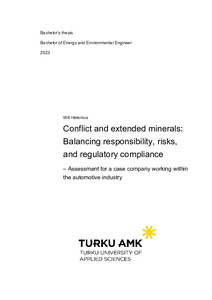Conflict and extended minerals : balancing responsibility, risks, and regulatory compliance
Helenius, Wili (2024)
Julkaisun pysyvä osoite on
https://urn.fi/URN:NBN:fi:amk-202402042472
https://urn.fi/URN:NBN:fi:amk-202402042472
Tiivistelmä
The supply chain of certain minerals, such as conflict and extended minerals, including gold, tantalum, tin, and tungsten, as well as cobalt and mica, respectively, have been associated with various environmental, human health, and social issues in particular. These minerals are often extracted from conflict-prone regions, and in some cases, the revenue generated from their production has been linked to the continuation of conflicts. Various regulations have been introduced to address these issues and regulate the sourcing and supply chains of these minerals.
The objective of this thesis was to assess the potential risks, adverse impacts in the supply chain, production, industrial applications, current and upcoming regulations with their associated obligations, and sourcing practices of conflict and extended minerals for a case company working within the automotive industry. This was done so that appropriate due diligence systems and measures could be implemented.
Through the assessment, it was determined that the company is currently in compliance with existing regulations regarding conflict and extended minerals sourcing. However, due to the upcoming regulations, as well as the risks and impacts associated with conflict and extended minerals, it is recommended that a due diligence system based on OECD guidance should be implemented.
The objective of this thesis was to assess the potential risks, adverse impacts in the supply chain, production, industrial applications, current and upcoming regulations with their associated obligations, and sourcing practices of conflict and extended minerals for a case company working within the automotive industry. This was done so that appropriate due diligence systems and measures could be implemented.
Through the assessment, it was determined that the company is currently in compliance with existing regulations regarding conflict and extended minerals sourcing. However, due to the upcoming regulations, as well as the risks and impacts associated with conflict and extended minerals, it is recommended that a due diligence system based on OECD guidance should be implemented.
